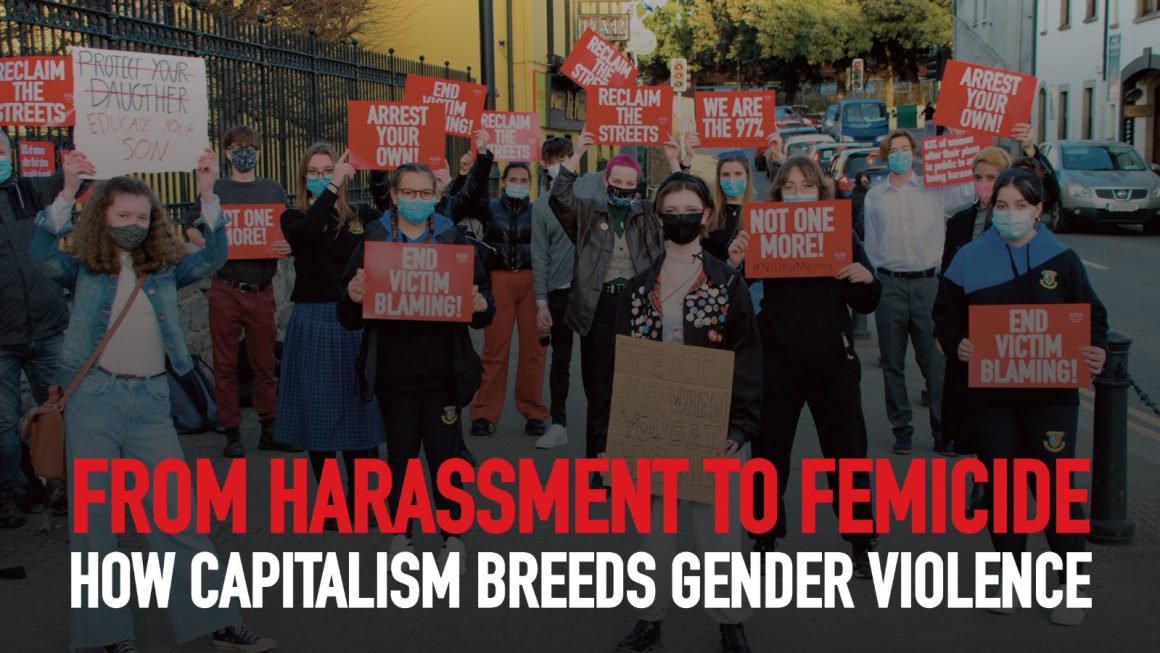By Harper Cleves
On 3 March 2021, 33 year-old Sarah Everard went missing. It was soon thereafter discovered that she had been kidnapped and murdered, most likely by a member of the Metropolitan police, while walking home at 9pm at night.
This event struck a chord with women and non-binary people across the UK and Ireland, where protests quickly emerged. Many people shared the phrase “text me when you get home” as well as stories of holding keys in their hand a certain way, running home from the bus stop, finding well lit paths etc. to highlight the myriad of ways in which women, trans and non-binary people have to alter their movements in order to remain safe in public space.
In fact that same week the European Agency for Fundamental Rights reported that 83% of women between ages 16-39 will change or limit where they go in public to avoid harassment, and the UN demonstrated that in the UK 97% of women between ages 18-24 had been sexually harassed.
A violent system
The anger at the root of these protests goes beyond gender violence committed by strangers; which in actuality accounts for a small minority of deaths and assaults faced by women. Recent events closer to home prove this. In the six weeks since Sarah Everard went missing, we have seen the untimely death of three women on this island; in each case the prime suspect is someone they knew. In Netwonabbey a double femicide was carried out by a vengeful son and partner, despite warnings of the man’s volatility beforehand to the PSNI. Just last weekend in Dublin, the 24-year-old mother of two Jennifer Poole was murdered in her home in Finglas after being held captive for a full day beforehand. The man arrested in connection with her murder was her partner.
The anger people feel as a result of these horrific and preventable acts of violence is directed at the misogynistic system which as a whole, shows nothing but disdain for working-class women in every aspect of life; from workplace interactions, to caregiving roles; to medical treatment. In the context of COVID 19, and a recession, where all pre-existing inequalities are being exacerbated, working-class women are more aware than ever that this system doesn’t serve them.
Part of the reason violence against women and gender non-conforming people is so prevalent in our society is because violence in general is so noramalised under capitalism.
Across the world, 53 countries use the death penalty as a legitimate means of punishing criminals. All save 19 countries in the world allow the day-to-day police force to carry firearms. In recent years in places like Hong Kong, Catalonia, and most recently in the UK we have seen the use of casual state violence to squash social movements and protests. Such violence is often framed in terms of “peace keeping,” “social order” and more recently, cynically framed as “COVID protection.”
On top of all of this, the combined interests of finance capital and dominant nations use moralistic arguments to justify imperialism and war in order to gain access to new markets and resources. Even though working-class people globally are the most common victims of this violence, they are also those targeted for recruitment into the armed forces, sometimes promised access to health care, education and stability while also being sold arguments about ‘peacekeeping missions,’ ‘protecting the nation,’ and ‘building democracy.’
Sexist ideology
And yet, this does not account for the gender imbalance of who carries out violence. A major study in the US, UK and Canada demonstrated that between 90-97% of perpetrators of violence in intimate relationships were men. To truly understand this, we have to understand how much class-based societies rely on rigid definitions of gender. Rigid gender definitions emerged with the family as class society developed. The “natural” predilections of women were a cultural justification to confine women to the home, in order to control her sexuality and ensure the passing down of property to future generations.
This ideology has developed and taken on its own character in the time since. Capitalist ideology uses the gender binary as a tool to create all kinds of unrealistic expectations in order to generate and protect profit, but this desire to protect profit has also led to a masculine culture of entitlement that develops its own logic.
Women being ideologically classified as natural caregivers saves governments around the world trillions of euros annually on health, elderly care, and childcare — but what follows from this ideological need of the system is that individual men think it is normal or natural to expect or not even notice that women are responsible for all household tasks.
Systemic inequality
In the south of Ireland new studies show that 10% of women have had to leave jobs because of the pressures of homeschooling their children; and that in 65% of households the mother is fully responsible for homeschooling the child as opposed to 5% of fathers. Women being hyper sexualised might turn a profit for the beauty industry, but it has also created a cultural expectation that men are entitled to sex, and that women must walk the tight rope of being both virginal and sex goddesses.
All of these dynamics stem from the needs of the capitalist system, but reflect themselves in the daily interpersonal interactions of individuals and in particular take the form of male entitlement. Gender violence is then an extreme expression of this entitlement.
Movements
All of this can sound bleak, and irresolvable, but if the present period shows us anything it is that when working-class women are backed into a corner, they will fight back rather than accept further abuse and exploitation, as recent developments on gender violence in Latin America, Turkey and France demonstrate. A socialist feminist movement led by young women, that consciously builds solidarity amongst all the exploited and oppressed, points a way forward towards not only challenging individual abusers, but the misogyny embedded in the capitalist system itself.












